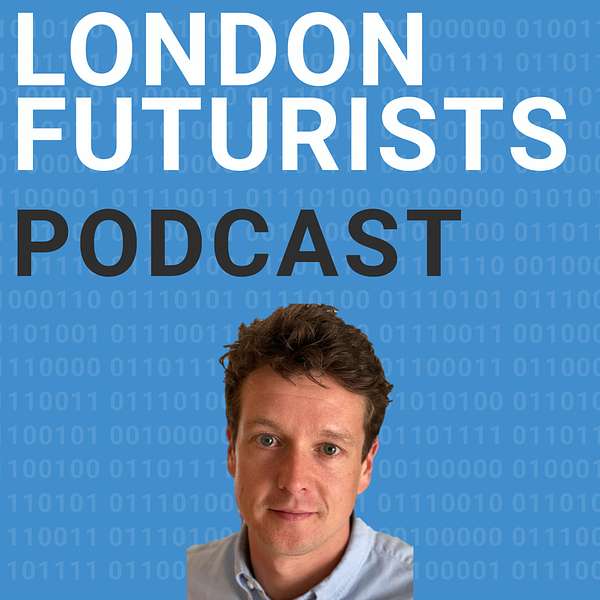
London Futurists
Anticipating and managing exponential impact - hosts David Wood and Calum Chace
Calum Chace is a sought-after keynote speaker and best-selling writer on artificial intelligence. He focuses on the medium- and long-term impact of AI on all of us, our societies and our economies. He advises companies and governments on AI policy.
His non-fiction books on AI are Surviving AI, about superintelligence, and The Economic Singularity, about the future of jobs. Both are now in their third editions.
He also wrote Pandora's Brain and Pandora’s Oracle, a pair of techno-thrillers about the first superintelligence. He is a regular contributor to magazines, newspapers, and radio.
In the last decade, Calum has given over 150 talks in 20 countries on six continents. Videos of his talks, and lots of other materials are available at https://calumchace.com/.
He is co-founder of a think tank focused on the future of jobs, called the Economic Singularity Foundation. The Foundation has published Stories from 2045, a collection of short stories written by its members.
Before becoming a full-time writer and speaker, Calum had a 30-year career in journalism and in business, as a marketer, a strategy consultant and a CEO. He studied philosophy, politics, and economics at Oxford University, which confirmed his suspicion that science fiction is actually philosophy in fancy dress.
David Wood is Chair of London Futurists, and is the author or lead editor of twelve books about the future, including The Singularity Principles, Vital Foresight, The Abolition of Aging, Smartphones and Beyond, and Sustainable Superabundance.
He is also principal of the independent futurist consultancy and publisher Delta Wisdom, executive director of the Longevity Escape Velocity (LEV) Foundation, Foresight Advisor at SingularityNET, and a board director at the IEET (Institute for Ethics and Emerging Technologies). He regularly gives keynote talks around the world on how to prepare for radical disruption. See https://deltawisdom.com/.
As a pioneer of the mobile computing and smartphone industry, he co-founded Symbian in 1998. By 2012, software written by his teams had been included as the operating system on 500 million smartphones.
From 2010 to 2013, he was Technology Planning Lead (CTO) of Accenture Mobility, where he also co-led Accenture’s Mobility Health business initiative.
Has an MA in Mathematics from Cambridge, where he also undertook doctoral research in the Philosophy of Science, and a DSc from the University of Westminster.
London Futurists
Preparing for Bletchley Park: behind the scenes, with Ollie Buckley
The launch of GPT-4 on the 14th of March this year was shocking as well as exciting. ChatGPT had been released the previous November, and became the fastest-growing app ever. But GPT-4’s capabilities were a level beyond, and it provoked remarkable comments from people who had previously said little about the future of AI. In May, Britain’s Prime Minister Rishi Sunak described superintelligence as an existential risk to humanity. A year ago, it would have been inconceivable for the leader of a major country to say such a thing.
The following month, in June, Sunak announced that a global summit on AI safety would be held in November at the historically resonant venue of Bletchley Park, the stately home where during World War Two, Alan Turing and others cracked the German Enigma code, and probably shortened the war by many months.
Despite the fact that AI is increasingly humanity’s most powerful technology, there is not yet an established forum for world leaders to discuss its longer term impacts, including accelerating automation, extended longevity, and the awesome prospect of superintelligence. The world needs its leaders to engage in a clear-eyed, honest, and well-informed discussion of these things.
The summit is scheduled for the 1st and 2nd of November, and Matt Clifford, the CEO of the high-profile VC firm Entrepreneur First, has taken a sabbatical to help prepare it.
To help us all understand what the summit might achieve, the guest in this episode is Ollie Buckley.
Ollie studied PPE at Oxford, and was later a policy fellow at Cambridge. After six years as a strategy consultant with Monitor, he spent a decade as a civil servant, developing digital technology policy in the Cabinet Office and elsewhere. Crucially, from 2018 to 2021 he was the founding Executive Director of the UK government's original AI governance advisory body, the Centre for Data Ethics & Innovation (CDEI), where he led some of the original policy development regarding the regulation of AI and data-driven technologies. Since then, he has been advising tech companies, civil society and international organisations on AI policy as a consultant.
Selected follow-ups:
https://www.linkedin.com/in/ollie-buckley-10064b/
https://www.publicaffairsnetworking.com/news/tech-policy-consultancy-boosts-data-and-ai-offer-with-senior-hire
https://www.gov.uk/government/publications/ai-safety-summit-programme/ai-safety-summit-day-1-and-2-programme
https://www.gov.uk/government/publications/ai-safety-summit-introduction/ai-safety-summit-introduction-html
An open event at Wilton Hall, Bletchley, the afternoon before the AI Safety Summit starts: https://www.meetup.com/london-futurists/events/296765860/
Music: Spike Protein, by Koi Discovery, available under CC0 1.0 Public Domain Declaration
Elevate how you lead with insight from today’s most influential executives.
Listen on: Apple Podcasts Spotify

